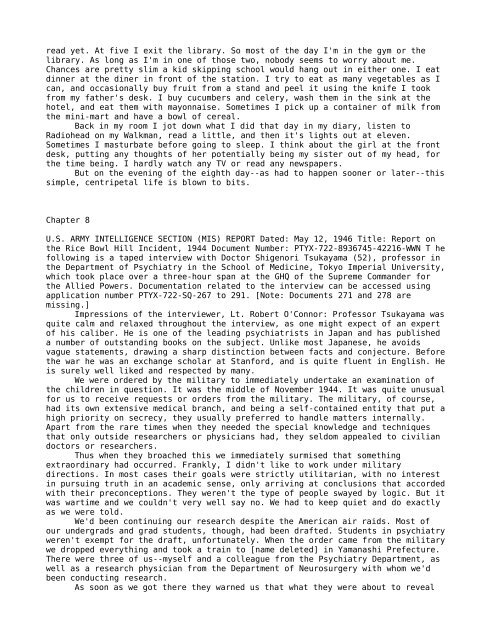You also want an ePaper? Increase the reach of your titles
YUMPU automatically turns print PDFs into web optimized ePapers that Google loves.
ead yet. At five I exit the library. So most of the day I'm in the gym or the<br />
library. As long as I'm in one of those two, nobody seems to worry about me.<br />
Chances are pretty slim a kid skipping school would hang out in either one. I eat<br />
dinner at the diner in front of the station. I try to eat as many vegetables as I<br />
can, and occasionally buy fruit from a stand and peel it using the knife I took<br />
from my father's desk. I buy cucumbers and celery, wash them in the sink at the<br />
hotel, and eat them with mayonnaise. Sometimes I pick up a container of milk from<br />
the mini-mart and have a bowl of cereal.<br />
Back in my room I jot down what I did that day in my diary, listen to<br />
Radiohead on my Walkman, read a little, and then it's lights out at eleven.<br />
Sometimes I masturbate before going to sleep. I think about the girl at the front<br />
desk, putting any thoughts of her potentially being my sister out of my head, for<br />
the time being. I hardly watch any TV or read any newspapers.<br />
But on the evening of the eighth day--as had to happen sooner or later--this<br />
simple, centripetal life is blown to bits.<br />
Chapter 8<br />
U.S. ARMY INTELLIGENCE SECTION (MIS) REPORT Dated: May 12, 1946 Title: Report on<br />
the Rice Bowl Hill Incident, 1944 Document Number: PTYX-722-8936745-42216-WWN T he<br />
following is a taped interview with Doctor Shigenori Tsukayama (52), professor in<br />
the Department of Psychiatry in the School of Medicine, Tokyo Imperial University,<br />
which took place over a three-hour span at the GHQ of the Supreme Commander for<br />
the Allied Powers. Documentation related to the interview can be accessed using<br />
application number PTYX-722-SQ-267 to 291. [Note: Documents 271 and 278 are<br />
missing.]<br />
Impressions of the interviewer, Lt. Robert O'Connor: Professor Tsukayama was<br />
quite calm and relaxed throughout the interview, as one might expect of an expert<br />
of his caliber. He is one of the leading psychiatrists in Japan and has published<br />
a number of outstanding <strong>book</strong>s on the subject. Unlike most Japanese, he avoids<br />
vague statements, drawing a sharp distinction between facts and conjecture. Before<br />
the war he was an exchange scholar at Stanford, and is quite fluent in English. He<br />
is surely well liked and respected by many.<br />
We were ordered by the military to immediately undertake an examination of<br />
the children in question. It was the middle of November 1944. It was quite unusual<br />
for us to receive requests or orders from the military. The military, of course,<br />
had its own extensive medical branch, and being a self-contained entity that put a<br />
high priority on secrecy, they usually preferred to handle matters internally.<br />
Apart from the rare times when they needed the special knowledge and techniques<br />
that only outside researchers or physicians had, they seldom appealed to civilian<br />
doctors or researchers.<br />
Thus when they broached this we immediately surmised that something<br />
extraordinary had occurred. Frankly, I didn't like to work under military<br />
directions. In most cases their goals were strictly utilitarian, with no interest<br />
in pursuing truth in an academic sense, only arriving at conclusions that accorded<br />
with their preconceptions. They weren't the type of people swayed by logic. But it<br />
was wartime and we couldn't very well say no. We had to keep quiet and do exactly<br />
as we were told.<br />
We'd been continuing our research despite the American air raids. Most of<br />
our undergrads and grad students, though, had been drafted. Students in psychiatry<br />
weren't exempt for the draft, unfortunately. When the order came from the military<br />
we dropped everything and took a train to [name deleted] in Yamanashi Prefecture.<br />
There were three of us--myself and a colleague from the Psychiatry Department, as<br />
well as a research physician from the Department of Neurosurgery with whom we'd<br />
been conducting research.<br />
As soon as we got there they warned us that what they were about to reveal


